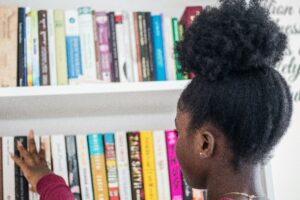This month sees both Children’s Week and International Day of the Girl Child. With these in mind, I thought I’d look at books told from the point of view of children, particularly girls.

Many of you will be familiar with The Girl, the Dog and the Writer series by Katrina Nannestad, and this month the conclusion to the trilogy, The Girl, the Dog and the Writer in Lucerne , is released. It’s always sad to farewell characters that you’ve become such good friends with. That said, children will absolutely adore this book – with fearless Freja solving an abominable crime against chocolate with her favourite assistants, Tobias and Finnegan. Freja is finally reunited with her mother, and the mystery of just what role Tobby has to play in Freja’s life is finally revealed. This book will have your students (and probably you!) laughing, crying and cheering as Freja finally finds a place, and people, to call home.

In Dear Sweet Pea, Sweet Pea DiMarco is just like lots of other kids her age, dealing with puberty, having to sit next to her ex-best-friend in class, and the trepidation of moving on to high school. Then, there’s all the extra things she has to figure out, like her parents splitting up and living two doors away from each other, juggling changing friendships, and – as her mother puts it – having a ‘bigger body’. So, when her next door neighbour, the local newspaper’s advice columnist, asks her to collect her mail, what could possibly go wrong? Sweet Pea is a character that lots of children will be able to relate to with her desire to stand up for herself, but the fear she sometimes feels in doing so, particularly when it’s really important. Teachers’ notes available.

Finally, we have All of Us. This non-fiction picture book is the story of two children as they go on an exploration of the history of Southeast Asia, and Australia’s relationship with this huge and diverse region. This beautifully put-together book uses a range of modes to convey its story, including maps, timelines, poetry, and amazingly detailed illustrations. This is the perfect text to have on hand for those students who like to dip in and out of texts, and who find visuals a helpful aid to absorbing and understanding information. It would also make a wonderful central text to use for Project-Based-Learning units addressing the Australian Curriculum Cross-curriculum priority of Asia and Australia’s Engagement with Asia. Extensive teachers’ notes available.
Read of the Month – Vox
Vox is part near-future dystopia, part thriller, part family drama, and all consuming!

Influenced by The Handmaid’s Tale and 1984, Vox shows us a United States of the foreseeable future where a tidal wave of ultra-conservative religion has swept the country. Women and girls have been removed from all spheres of life outside the home, and now wear counters on their wrists that restrict them to 100 words a day. For Jean, a world-leading linguist before the Purity movement took over, life is barely tolerable. She worries particularly for the effect it’s having on her daughter, who not only has her speech restricted, but whose education no longer includes learning to read and write. Then one day the President’s brother has an accident, an accident that affects him right in the area of the brain that is Jean’s area of expertise.
When Jean has the opportunity to go back to paid work, not only does she take it, but she uses it to work against the system that has, quite literally, turned her into a second-class citizen. The rest of the novel is one hell of a ride!
Vox does an excellent job of slowly revealing the world in which Jean, and the rest of America, find themselves – the details of everyday life and how it came about. And it’s terrifying. This book is clearly intended as a warning of what could happen if people don’t stand up against the small, incremental steps of injustice against women and minority groups that are already happening in many parts of the Western world.




